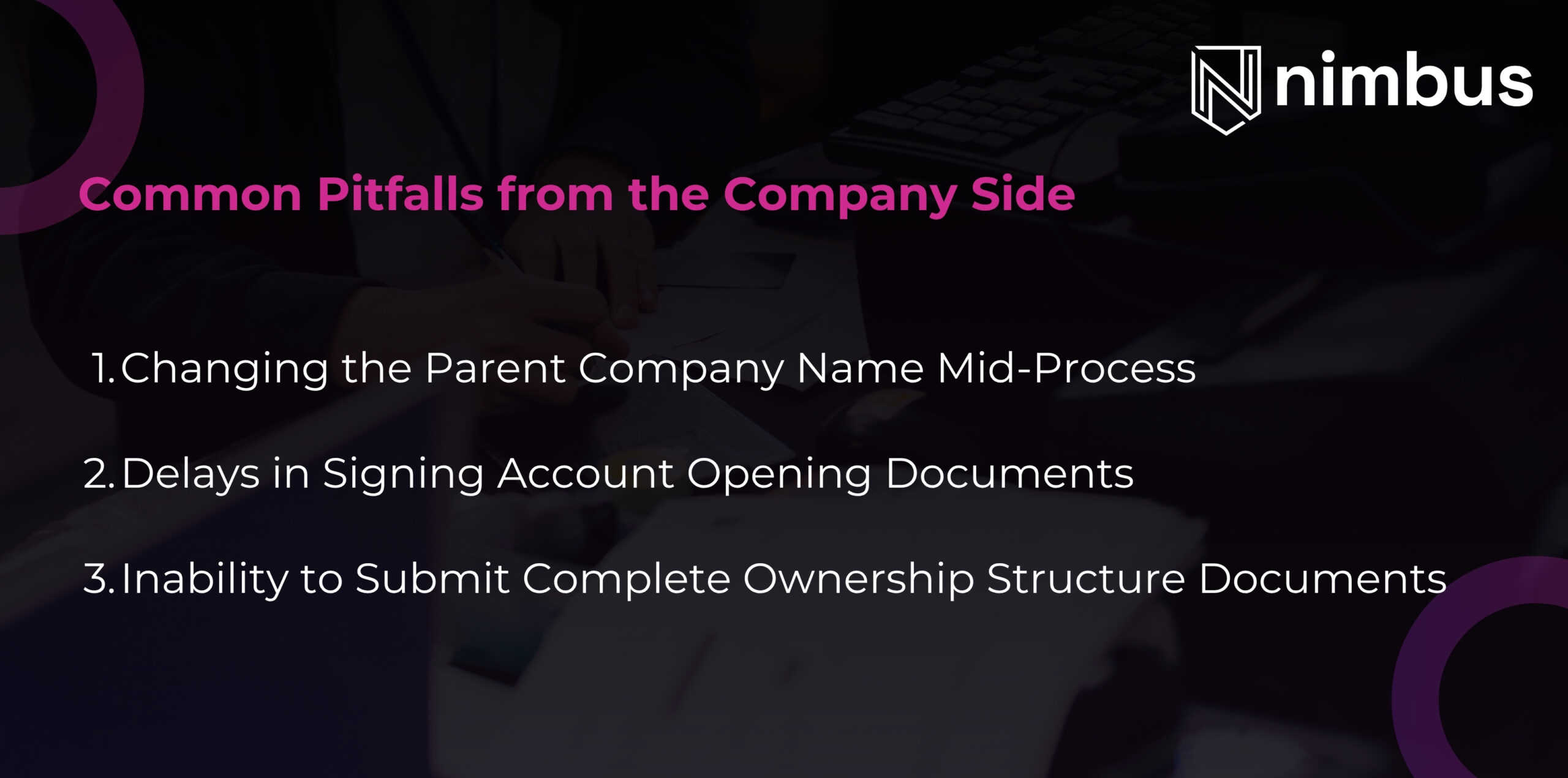Company formation in Saudi Arabia can open the doors to significant growth in a dynamic and rapidly evolving market for global businesses. However, one of the most frequently overlooked challenges for foreign-owned businesses is the delay in setting up a local bank account.
While it might seem like a routine administrative task, failure to plan appropriately can cause severe disruptions, particularly for companies with active contracts and financial obligations in the Kingdom.
Setting up a corporate bank account is part of the third phase in the 20-step business setup process in Saudi Arabia. It’s essential that businesses entering the Saudi market for the first time understand both the procedural and strategic elements involved to avoid common pitfalls.
This article breaks down the reasons behind delays in bank account setup, using real case studies to highlight potential risks and how businesses can avoid them.
Common Pitfalls from the Company Side

1. Changing the Parent Company Name Mid-Process
A common but costly mistake occurs when a company changes the name of its parent company after beginning operations in Saudi Arabia. One real case involved a company that had completed the issuance of its Iqama (residency permit) and then opted to change the parent company’s legal name.
This necessitated reissuing key documents, including the MISA license, Commercial Registration (CR), and Articles of Association. These changes required re-attestation of all parent company documents in compliance with Saudi regulations.
This process significantly delayed the opening of the company’s bank account. Contracts with local clients were put on hold due to the absence of a valid bank account, resulting in missed payments and late fees due to non-compliance.
Tip: Complete all bank account procedures before making significant legal changes such as altering the parent company’s name.
2. Delays in Signing Account Opening Documents
In another scenario, a company received approval from the bank to open an account, but the designated point of contact did not sign the documents within the required timeframe.
As a result, the system automatically invalidated the account opening request. The company was unable to make government-related payments and could not activate several pending contracts that required a Saudi bank account.
Tip: Ensure that all account opening agreements are signed promptly after bank approval to avoid automatic invalidation and delays in operations.
3. Inability to Submit Complete Ownership Structure Documents
When a company is owned by a consortium or multiple entities, providing the full ownership documentation can be challenging. In one case, the client could not supply all commercial registers of the owning companies or the passports of individual stakeholders.
Consequently, both the MISA license and CR expired before the account could be opened. As a result, the company had to absorb additional costs to renew its licenses and was barred from conducting business in Saudi Arabia until its compliance issues were resolved.
Tip: Maintain all ownership documentation in an updated state and submit required documents at least 90 days before the expiration of the current licenses.
Common Delays from the Banking Side

1. High-Risk Entity Classification
Large multinational companies may be classified by banks as high-risk entities. This classification typically results in extended due diligence and approval timelines.
Banks often require internal legal reviews, which can take several weeks. Further, banks may conduct site visits and request additional documentation to verify the legitimacy and operations of the company.
For companies with ongoing contracts or license applications dependent on an operational bank account, these delays can result in suspended operations or postponed project kick-offs.
Tip: Work with a banking partner or business setup services provider in Saudi Arabia who understands the internal workflows of Saudi banks and can proactively follow up to reduce waiting periods.
2. Technical Issues Within Banks
Technology-related delays can also hinder the account setup process. In one instance, a technical issue within the bank’s system significantly slowed down account activation. The delay impacted several businesses relying on the bank for timely setup.
Tip: Engage partners with established banking relationships and on-ground teams who can escalate and troubleshoot such issues in real-time.
Best Practices for a Smooth Account Setup
To navigate the bank account setup process efficiently, foreign-owned businesses should adopt the following best practices:
- Finalize bank account setup before making any legal changes to parent or holding companies.
- Respond quickly to bank requests, especially for signing agreements or submitting identification documents.
- Keep all ownership documents, CRs, and licenses current and ready for submission well ahead of expiration.
- Join experienced advisory firms like Nimbus Consultancy to avoid costly mistakes.
Take Prompt Actions
Delays in bank account setup can have far-reaching effects on business incorporation in Saudi Arabia. From paused contracts and government payment issues to the financial strain of license renewals, the impact can be drastic.
Being aware of these pitfalls and being proactive can save your business valuable time, resources, and reputation. Saudi Arabia remains a promising market, but it rewards those who prepare thoroughly.



